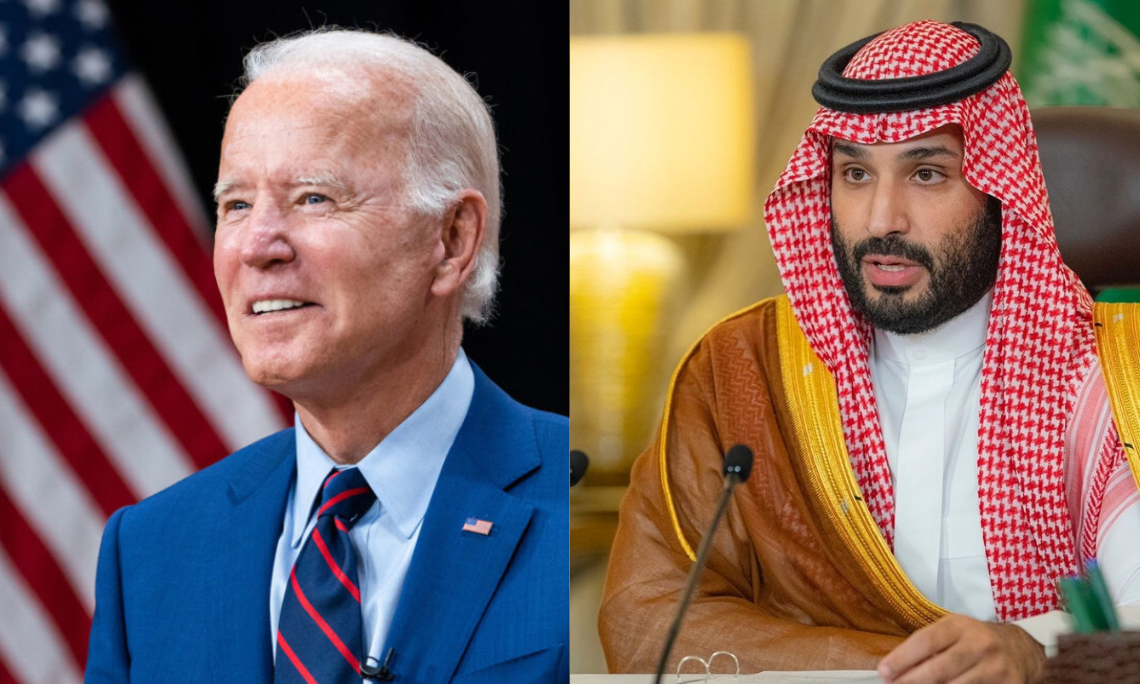Read anything said about democracy and America by President Kennedy and President Reagan; read anything about Saudi Arabia’s bloody record of its repression of democracy and human rights; then try not to feel embarrassed and angry by the news that the President of the United States is travelling to Saudi Arabia to kiss the ring of that country’s dictator and beg for access to more oil.
There is an idea from President Kennedy, that the strength of our leadership in the world is not based on the strength of our armies but on the example of our civilization. From President Reagan we have the idea that our strength comes from our defense of democracy and self-determination, wherever in the world people speak up and demand it for themselves. Keep these thoughts in mind and consider that the world looks to the U.S., and wants to continue to do so, because of what it can accomplish for the progress of humanity.
Where the U.S. has been fully committed to fostering democracy and self-determination, it has fostered the establishment of some of the world’s strongest global leaders, economies, and our closest friends and partners. The nature of these other democracies – that is their strength in the international community and commitment to self-determination – have made the world a better place. When the U.S. has made commitments to democracy, equality, human rights, and self-determination, remarkable progress in the quality of humanity has been the result.
Where the U.S. has ignored the demands of people who want a democracy of their own and the right to self-determination, i.e. in Saudi Arabia and Bahrain, it has allowed one of the most repressive authoritarian governments and one of the least free countries in the world to flourish. Freedom House’s 2022 Freedom in the World report has ranked Iran as being more free with greater political rights than both Saudi Arabia and Bahrain. When U.S. leaders choose not to position themselves between the destructive force of authoritarianism and people who are speaking up and asking for democracy, the world moves backward.
For the President of the United States – after saying that “human rights will be the center of our foreign policy,” and that Saudi Arabia would be punished for killing the Washington Post reporter Jamal Khashoggi as a warning to other dictators – to travel to the Gulf region and meet with the dictators of Saudi Arabia and Bahrain cheapens the significance of U.S. leadership; for the leader of the free world to travel and meet with enemies of democracy, violent perpetrators of human rights abuses, and manipulators of the international community’s multilateral institutions for more oil does not demonstrate that “America is back.”
For the people of Saudi Arabia and Bahrain, the teacher, the doctor, the writer, and the child in school who are peacefully standing in public spaces demonstrating to create a democracy of their own and being imprisoned and killed for it by these dictators, President Biden’s trip there to “repair the rupture in relations” with those dictators is a betrayal. The President should not be courting the goodwill of dictators who perform mass executions of pro-democracy activists like Saudi Arabia, or jail nearly 1500 activists like Bahrain.
Not holding the dictators of these countries accountable for their violence against rights activists and then courting them for good-will and access to oil is a poor recalibration in a bilateral relationship. U.S. support for dictators in Saudi Arabia and Bahrain – both enemies of democracy – who maintain their grasp on power with methods which nearly all of humanity has rejected, sends a signal to the world that the values of the U.S. and its title as leader of the free world might not mean as much as it once did.
Not only have Saudi Arabia and Bahrain actively worked to stop the advance of democracy, at least one of them might be trying to do the same to American democracy. Saudi Arabia and Bahrain’s public relations and marketing campaigns predictably give a different narrative but, a reasonable investigation of their human rights record will demonstrate to a reasonable person, one who is not beholden to U.S. foreign policy orthodoxy, that these dictatorships, if left unchecked, are a danger to democracy.
If democracy and freedom have improved the world and are the vehicle by which a better world may yet still be created, the democratic community, and especially President Biden, must be strong together and oppose tyranny. This begins with rejecting dictators and protecting people who want to be part of that community and are bravely standing up to dictators to achieve it. For the sake of our own democracy, for the progress of humanity, and for a future where freedom of conscience and expression are free everywhere, we must reject the dictators of Saudi Arabia and Bahrain; to meet with them is a betrayal of democracy and of the people who have died in its defense.





